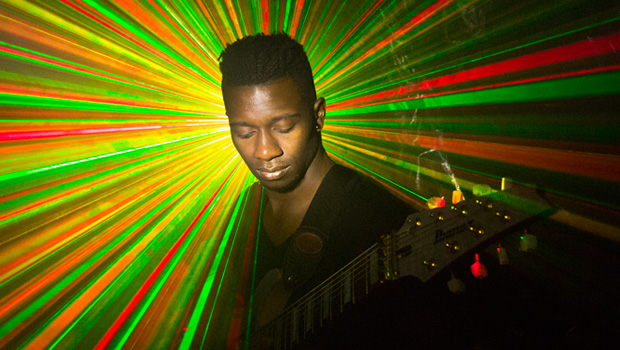Animals As Leaders Guitarist Tosin Abasi Discovers 'The Joy of Motion'

Having given the instrumental prog-metal envelope a serious push with their first two records—2009’s Animals As Leaders and 2011’s Weightless—Tosin Abasi and longtime guitar partner Javier Reyes are taking their virtuoso approach to the next level on their latest effort, The Joy of Motion.
“Prog as an ideology should be, in essence, a progression,” Abasi says.
“It should be constantly stepping forward and exploring new territory. We really like the essence of what progressive means, so we want to incorporate cutting-edge sounds and maybe bring elements into progressive metal that are really far removed from metal.
So for The Joy of Motion, we referenced electronic music, jazz and various other genres, because to us, that really contributes to our sound—and that makes it sound progressive to us, because it’s new.”
Abasi and Reyes’ inter-locking eight-string riffs still play a major part in AAL’s sound, of course. Likewise, the pair’s signature playing styles—which involve a radical mixture of sweep picking, two-handed tapping and funk-style slapping—are present and accounted for.
But The Joy of Motion is also more dynamic than their previous albums: it’s the first AAL record to utilize live drums (courtesy of Matt Garstka) on top of pre-programmed electronic beats, and it places a greater emphasis on clean and acoustic guitar tones.
“I think it’s just a natural progression for both me and Tosin as players,” Reyes says. “It’s been a natural evolution to write a lot of clean stuff. At the same time, this might be our heaviest album. There’s a lot of high-gain stuff on there, but the blend of that and the clean songs and the thumping songs makes it more interesting than what we’ve done in the past.”
“I think this album shows a different side of my guitar playing,” Abasi adds, “because here’s actually less soloing. And for the solos that do occur, I’m playing differently than I was. There’s way less shred, if I’m going to be blunt about it, but I think it’s more lyrical. I started to get into modern gospel and neo-soul, listening to jazz-influenced R&B guitarists like Jairus Mozee and Isaiah Sharkey, and I think it’s kind of bled into my phrasing now.”
Having firmly established himself as a guitar hero for the djent generation, Abasi admits he felt some pressure to further ratchet up the fretboard wizardry on the new album. “Dude, yeah,” he says with a laugh.
“And it’s not a good pressure, because I don’t like the pissing contest of, ‘How complex can your time signatures and arrangements be?’ or ‘How fast are you shredding?’ That was never my motivation. I had to battle a lot of internal anxiety—the feeling like I had to prove something with this record.
“But honestly, after some examination, that stuff really ceased to be important at all to me. What I hoped to do with this record was make music that would impact people emotionally, whether they played guitar or not.”
Photo: Sean Murphy
Get The Pick Newsletter
All the latest guitar news, interviews, lessons, reviews, deals and more, direct to your inbox!
